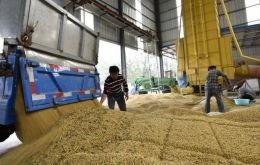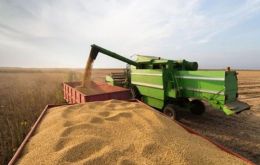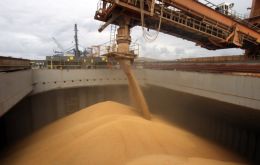MercoPress. South Atlantic News Agency
Tag: Soybeans
-
Saturday, July 29th 2023 - 11:11 UTC
Argentina forced to import 6,1 million tons of soybeans in first half of 2023

Argentina hit by a once-in-a-lifetime drought, has been forced to import 6,1 million tons of soybeans in the first half of 2023, according to data published by the Rosario Stock Exchange. The volume, the highest ever recorded for the period, is triple the amount imported in the first half of last year. It is also very close to the 2018 annual record when the country imported 6.4 million tons of soybeans.
-
Monday, November 7th 2022 - 09:55 UTC
Brazil soaring exports of corn and soybeans

Brazil maize exports reached almost 32 million tons in the first ten months of the year, which is more than double the volume shipped in the same period in 202, (14,5 million tons), according to the country's National Association of Cereal Exporters, ANEC.
-
Saturday, July 9th 2022 - 09:30 UTC
Brazil grains crop estimate, 272.5 million tons helped by corn and wheat despite a slide in soybeans

Given more optimistic prospects for the supply of corn and wheat, Brazil's National Supply Company, Conab, increased, slightly, the estimate for the 2021/22 market year grain harvest. Overall this has meant that Brazil is expected to have a crop of 272.5 million tons of grains in the current season, 6.7% greater than the previous season.
-
Wednesday, March 23rd 2022 - 09:15 UTC
Brazilian two-month record breaking sales of soybeans and rice

Brazilian oilseeds and grain exports are booming. China's purchases of soybeans more than doubled in the first two months of the year, while husk rice overseas sales during February jumped 65% compared to a year ago.
-
Monday, February 21st 2022 - 09:58 UTC
Paraguay could be forced to import soybeans because drought has halved production

The South American drought that has extended to several Argentine provinces and Brazilian states has also hit hard Paraguay, the world's fourth exporter of soybeans. In effect, crops are suffering and the processing industry is running out of supplies.
-
Saturday, September 25th 2021 - 09:31 UTC
Brazil expects to harvest a record 143,75 million tons of soybeans in 2021/22

With different climate prospects, clearly more positive than last season, Brazil expects to harvest in 2021/22 a new record of some 143,75 million tons of soybeans, according to a survey with information from the main sowing states.
-
Tuesday, August 31st 2021 - 09:08 UTC
Brazil confident soybeans harvest will confirm it continues as the world's leader in the oilseed production

Brazil's National Supply Company, Conab, anticipated forecasts for the coming grains and oilseeds season 2021/22. The soy crop is expected to reach some 141,26 million tons or a 3.9% increase over the current harvest.
-
Wednesday, December 23rd 2020 - 09:40 UTC
Weather and ports' strike in Argentina boosting soy and cereals prices

United States soybeans climbed to six-year highs this week as weather and export troubles in Argentina outweighed concerns of a new coronavirus strain hitting Britain. Corn and wheat futures traded near even as soybeans supported the grains complex.
-
Thursday, December 10th 2020 - 09:09 UTC
Argentine oilseed and grains exports stalled with new wage strike

Argentine grains inspectors and oilseeds workers started a new wage strike on Wednesday, organizers said in a joint statement, as stalling contract negotiations threatened to interrupt exports from one of the world's main bread baskets.
-
Wednesday, December 9th 2020 - 08:20 UTC
Brazil imported 748,000 tons of soybeans in eleven months of 2020

Brazil soybean imports during November reached 122,000 tons, 20 times more than in November 2019 (6,000 tons). Purchases cost US$ 49.2 million, compared to the US$ 1.9 million spent a year earlier, as the average value of the ton purchased increased from US $328.8 to US$ 402.4, according to the Brazilian Foreign Trade Secretariat, SECEX.
